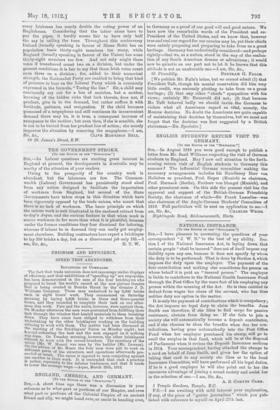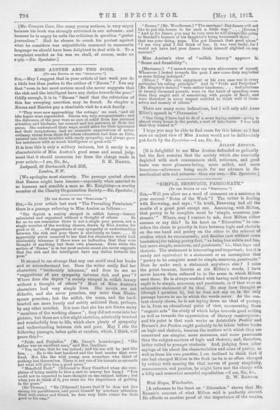NATIONAL INSURANCE.
[TO THE EDITOR OP VTR "SPECTATOR"] have pleasure in answering the questions of your correspondent "J. W. B." to the best of my ability. Sec- tion 1 of the National Insurance Act, in laying down that certain people " shall be insured " does not of itself impose any liability upon any one, because it does not specify by whom the duty is to be performed. That is done by Section 4, which imposes the duty upon the employer. The payment of the first contribution and nothing else constitutes the person on whose behalf it is paid an " insured person." The employer is liable to contribute to the National Health Insurance Fund through the Post Office by the mere fact of his employing any person within the meaning of the Act. He is then entitled to deduct from wages the share of the servant, who has thus neither duty nor option in the matter.
It is only the payment of contributions which is compulsory; the Act imposes no legal duty to claim the benefits. Jane Smith can therefore, if she likes to find scope for passive resistance, abstain from doing so. If she fails to join a society she will automatically become a deposit contributor, and if she chooses to shun the benefits when due her con- tributions, having gone automatically into the Post Office Fund when her employer purchased his stamp, will go to swell the surplus in that fund, which will be at the disposal of Parliament when it revises the Deposit Insurance sections in 1914. Your correspondent, having attached the stamps to a card on behalf of Jane Smith, and given her the option of taking that card to any society she likes or to the local Insurance Committee, will have performed all his legal duties. If ho is a good employer he will also point out to her the enormous advantage of joining a sound society and assist her in the selection of one.—I am, Sir, &o.,
A. S. CO
P.S.—I am awaiting with mild interest your explanation, if any, of the piece of "gutter journalism" which you pub- fished with reference to myself on April 27th last. [Mr. Comyns Carr, like many young authors, is very angry because his book was strongly criticised in our columns ; and because he is angry he calls the criticism in question " gutter journalism." Had he chosen to couch his protest against what he considers was unjustifiable comment in reasonable language we should have been delighted to deal with it. To a complaint worded as his was we shall, of course, make no vply.—ED. Spectator.]











































 Previous page
Previous page